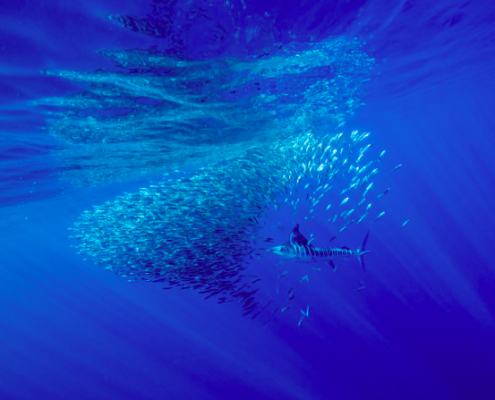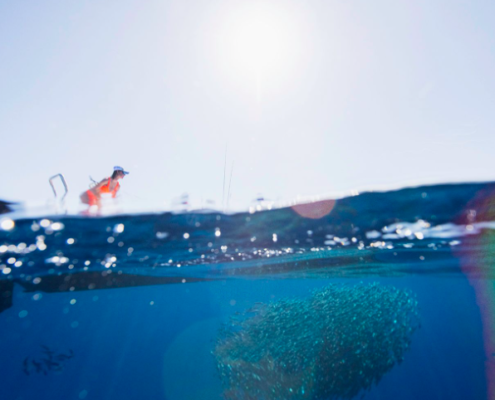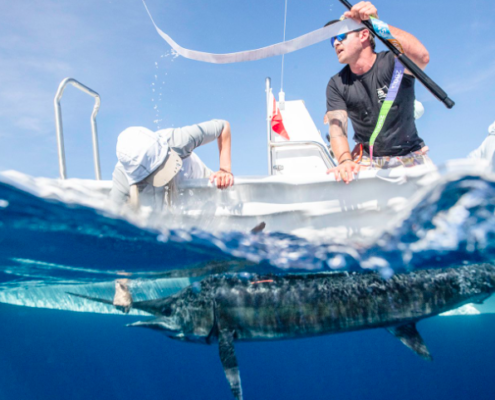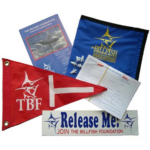
For years, we have all heard about the amazing fishery and waters in Magdalena Bay, Mexico. From the hookups of doubles, triples, and quads of striped marlin with daily releases in the triple digits, it is not surprising that a number of our tag and release winners utilize this incredible location to secure some of our top annual awards. While the fishery as a whole may be renowned by offshore anglers, our current knowledge about the striped marlin fishery in particular is merely surface level. As always, our goal is to conserve, educate, and promote sustainable fishing in locations such as this to ensure anglers can enjoy it for generations to come. Traveling to Magdalena Bay, however, is no easy feat. To have the opportunity to conduct scientific satellite tagging research on striped marlin within those waters on the fly is even more difficult. In late 2022, TBF was given that chance.
In 2021, one of our tag and release partners, Costa Del Mar Sunglasses hatched an ambitious, multi-year plan, called The Marlin-Fly Project, to satellite (and traditionally) tag striped marlin within this pristine and awe-inspiring fishery. With the help of the local fishing community and a fleet of pangas, the goal was to satellite tag striped marlin on the fly and collect never seen-before data.
In December 2022, Costa’s plan came to fruition. TBF’s Peter Chaibongsai and one of TBF’s research partners, Jeremy Higgs from the University of Southern Mississippi were invited to not only help deploy these tags during this three-day mission, but to also highlight the importance of why scientific expeditions such as these are vital for the fishery, the local community and fisheries management. Costa also invited numerous professional fly anglers from all over the world to join in this one-of-a-kind tagging expedition. It was a unique opportunity for TBF to connect with these anglers, listen to their stories, and watch them cast wherever they wanted to in the water. We had great discussions about conservation efforts and it was amazing to see so many people truly engaged and passionate about protecting our resources.

To make it happen, Costa partnered with Los Locos Mag Bay, which has set up an impressive grassroots operation in San Carlos working directly with local fishermen to serve as captains. While the scientific aspect and professional collaboration were the primary focus, TBF was appreciative to have the opportunity to converse with and learn from some of the locals regarding their traditions and tales of those native to the region. Their help and knowledge were invaluable.

Another interesting aspect of this trip revolved around the actual deployment of the tags. Before this campaign, deploying a satellite tag on a marlin with the use of fly gear was never considered to be a viable option by the scientific community. There were concerns about fight time, stress on the fish, and post-release survivability. To combat those fears, we discussed the importance of tagging fish in less than 30 minutes once caught on the fly. We also carefully evaluated each fish before we tagged them, making sure it was a good, healthy, and strong candidate for the tag to maximize its chance of survival. If they didn’t pass these criteria then they would not get a satellite tag.
While there were definitely some reservations about the ability to deploy all the satellite tags using this technique (or any technique in general) within the said time frame, our deployment numbers spoke for themselves. In roughly the first 24 hours of fishing, all 15 satellite tags were deployed. Once those tags were exhausted, the team continued to deploy approximately 20 traditional tags. The collective effort of everyone involved was nothing short of spectacular to witness.
Following the trip, Costa publicly announced for the first time Costa’s Marlin-Fly Project at TBF’s Tag and Release Ceremony with a short presentation, some great stills, and a short video trailer that highlighted this incredible expedition.
We at TBF want to thank Costa Sunglasses again for including us in this unforgettable experience, and for their continued commitment to billfish conservation/research and the offshore community. We’re excited to see what unfolds as tags begin popping off and transmitting data in the upcoming months. As we continue to learn more about these fish and the surrounding fisheries, we can continue to fill in crucial data gaps that will be vital for leading discussions on the local and international management of this highly migratory species. Be on the lookout for more data from this trip, and thank you again to everyone who helped make this a reality.






